
by OnSight | Mar 2017 | BIkes, Press and Media, USA Pro Cycling, Velorama
The RiNo Art District will serve as the stage this August for “Velorama Colorado,” an entertainment experience that will be part bike race and celebration of bicycle culture, part music festival, part craft-goods marketplace, and entirely entertaining, RPM Events Group announced today.

Hall-of-famer Bill Walton at the Velorama Colorado announcement Wednesday March 1, 2017. (Evan Semón Photography)
“With Velorama Colorado, we are re-imagining bike racing as the centerpiece of a large-scale community event,” said David Koff, CEO of RPM Events Group. “By locating the festival in the RiNo Art District and adding the right musical acts, a massive marketplace, criterium racing, ranging from the serious to the whimsical to the charitable, and local food and drink, we will broaden the appeal of an already wildly popular sport.”From Aug. 11-13, Velorama Colorado will feature some of the world’s bests cyclists racing in the Denver stages of the Colorado Classic; national music acts including Wilco and Death Cab for Cutie; and hundreds of vendors in a festival marketplace that includes a Bike Expo and is anchored by Denver Flea and the independent craft makers of beer, cider and wine in the RiNo Art District.
The innovative blend of bicycling, music and all-things-Colorado immediately attracted the attention of basketball Hall-of-Famer Bill Walton, an avid cyclist and music lover. “Denver and Colorado are innovators, whether it’s celebrating what makes this place special, launching a new technology or re-inventing a bike race. I expect nothing but the same from Velorama Colorado,” said Walton, who flew in for the announcement.
“Coloradans’ love of cycling is matched — and maybe even exceeded — by their passion for great food, beer and music,” said Gov. John Hickenlooper. “Velorama Colorado is the kind of creative approach that Colorado is known for in that it creates a winning combination of those passions that will benefit our state and communities for years to come.”
The Colorado Classic will be held Aug. 10-13, with starts and finishes in Colorado Springs, Breckenridge, and Denver. Sanctioned by Union Cycliste Internationale and USA Cycling, the Colorado Classic will feature the sport’s top squads.
Free live music and other festivities are planned for the exciting men’s and women’s start-and-finish areas in Colorado Springs and Breckenridge on Aug. 10 and Aug. 11, respectively.
The ticketed Velorama Colorado festival is planned around the race’s Denver start-and-finish area, and will be headquartered in the RiNo Art District:
- Friday night, Aug. 11: Women’s criterium; music headliner Wilco; and festival marketplace.
- Saturday, Aug.12: Stage 3 men’s race (RiNo start/finish and Peak to Peak Hwy out-and-back); music headliner Death Cab for Cutie; and festival marketplace.
- Sunday Aug. 13: Stage 4 of men’s race (RiNo criterium and city circuit) and closing ceremonies; Family Music and Fun Day; and festival marketplace.
The marketplace includes a Bike Expo of nearly 150 exhibitors, festival merchandise; food from local merchants; areas for beer, wine and cider provided by the independent craft producers located in RiNo; and an expanded version of the Denver Flea with nearly 200 craft vendors.
“Teaming up with Velorama Colorado is a special opportunity for Denver Flea. Our missions couldn’t be more aligned, as both of us are committed to enlivening places and building community while having fun doing it,” said Denver Flea’s Blake Adams. “I’m excited to combine a major bike race and amazing musicians with the region’s finest artisan and emerging brands.”
A limited number of early-bird daily Velorama Colorado tickets go on sale at www.VeloramaColorado.com for $25 each beginning at 10 a.m. on Friday, March 3. Once those tickets are gone, advanced daily tickets will be offered online for $35 each. Walk-up prices will be $45 per day. VIP packages are also available.
“Whether it’s a general admission ticket or a VIP experience, a day at Velorama will be a great experience at a great price,” said Koff. “For less than the price of a concert ticket, you get a full day of music, food, beer, crafts and bike-centric fun — plus great views of the Colorado Classic.”
Moreover, a portion of ticket sales will be donated to Bicycle Colorado, the RiNo Art District and other initiatives as part of RPM Event Group’s mission to invest back in the community.
Velorama Colorado is bringing a new financial approach to pro bike racing in the United States.
“One of the challenges has been creating a business plan that is profitable and sustainable over the long run,” said Koff. “By imagining an event that is more than a bike race and bringing a ‘gate’ to the sport, we are confident that we can build an annual event that is anchored in Colorado and gives back to the community in meaningful ways.”
That approach was highlighted by Lindsey Hendershot, with the RiNo Art District: “This is the first major event of this scale to be held in RiNo. We love the mission to reinvent bike racing by bringing in additional creative partners from the neighborhood and to give back to the community,” she said.
About RPM Events Group: The Colorado Classic and Velorama Colorado are being produced by RPM Events Group, which includes civic-minded investors with a vision of re-inventing cycling events that are sustainable and fun, while providing a long-term positive social and economic impact to citizens and communities.
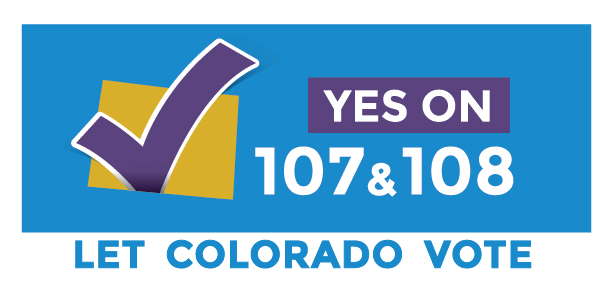
by OnSight | Sep 2016 | Campaign, Elections, Let Colorado Vote, Press and Media, video
Ad to run on digital platforms, in TV markets across Colorado
DENVER — Today, Let Colorado Vote, the campaign dedicated to building consensus for policies to increase voter access and participation, launched its first advertisement of the election season.
“Can we play?” highlights the unfairness of Colorado’s current election systems that limit participation and choice and urges voters to make our elections better by Voting Yes on Propositions 107 & 108.
“Thanks to our committed supporters from across the state, who share our desire for elections in Colorado that are more fair and inclusive, we have raised the resources to communicate our message broadly,” said campaign chair Kent Thiry, Chairman and CEO of DaVita. “Propositions 107 and 108 are essential for strengthening our Democracy in Colorado by including the more than 1 million unaffiliated Coloradans who currently pay taxes for elections they are banned from participating in.”
Here is a link to the ad that will begin airing today online and is planned to run on broadcast networks and cable systems in Denver, Colorado Springs and Grand Junction.<
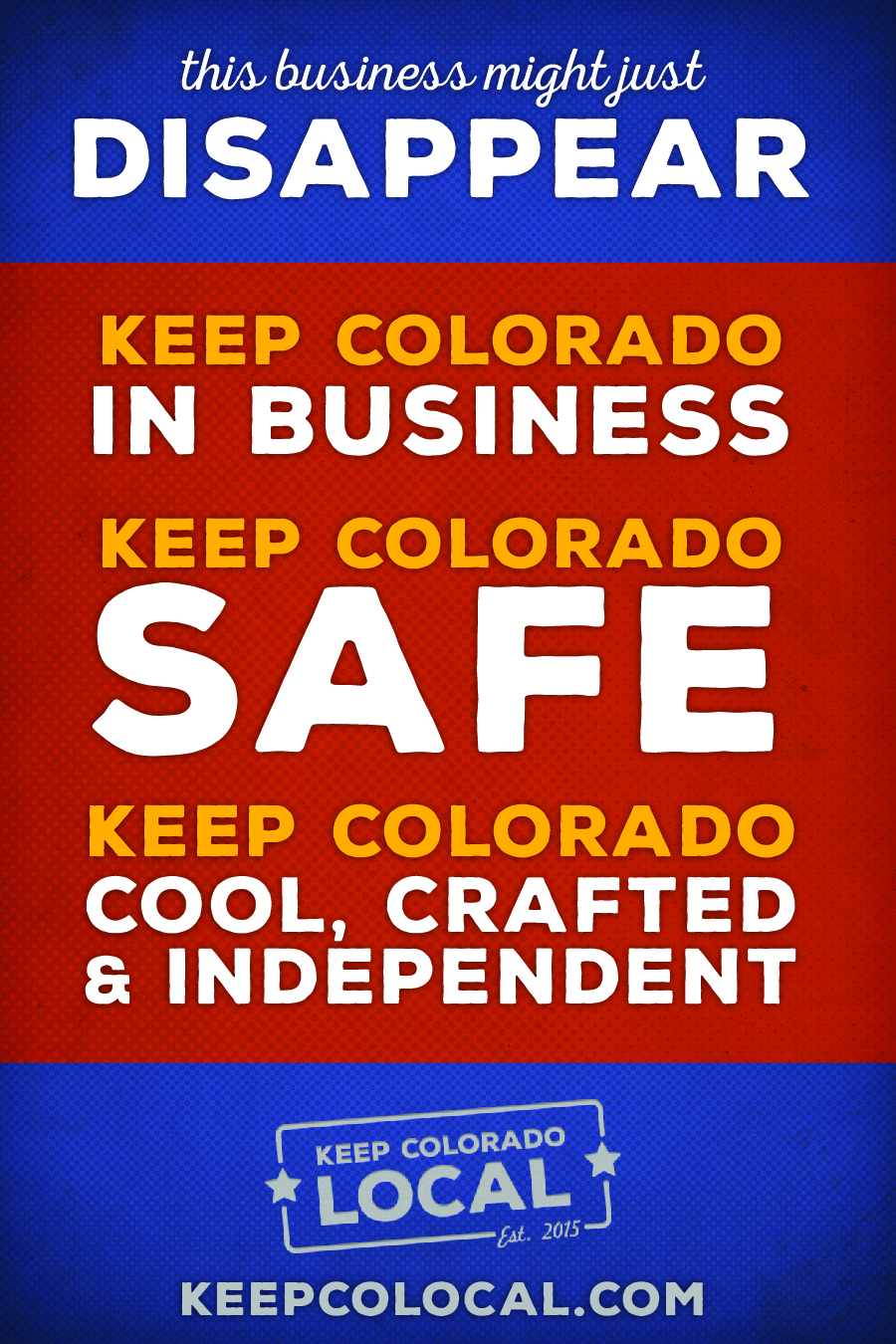
by OnSight | Mar 2015 | Beer, Graphics, Keep Colorado Local, Press and Media, Print Communications
You’ve heard of shopping local, but voting local might be next.
In March, over 100 Coloradans from craft breweries, local vineyards, distillers, and local businesses got together at a local liquor store. No, that’s not the start of a joke. It’s the start of an effort called Keep Colorado Local.
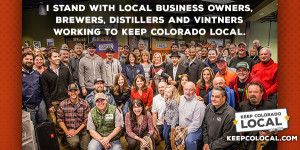 The Keep Colorado Local coalition represents over 1,000 local businesses. These independent businesses joined the Keep Colorado Local campaign to fight out-of-state corporations and keep them from changing our liquor laws and allowing chain stores to sell alcohol. OnSight is proud to build this effort and grow a coalition to defend local businesses, preserve public safety, and protect Colorado’s craft culture.
The Keep Colorado Local coalition represents over 1,000 local businesses. These independent businesses joined the Keep Colorado Local campaign to fight out-of-state corporations and keep them from changing our liquor laws and allowing chain stores to sell alcohol. OnSight is proud to build this effort and grow a coalition to defend local businesses, preserve public safety, and protect Colorado’s craft culture.
These local businesses are working on this issue together, because it could be on your ballot sometime soon. Out-of-state corporations are gearing up for a ballot measure in the 2016 election, and Colorado businesses aren’t wasting any time to spread the word about the dangers of alcohol sales in chain stores.
The Keep Colorado Local campaign keeps the focus on the businesses, people, and Colorado culture that would be hurt. As many as 700 local stores would be put out of business, and we’d lose over 10,000 jobs. Our craft selection would be completely watered down, and the small brewery or distiller would lose out on shelf space because chain stores prioritize mass-produced products. Alcohol in chain stores would also mean easy availability for minors to steal or illegally buy alcohol.
Onsight is building a strategic campaign to share this message online, in businesses and in the news:
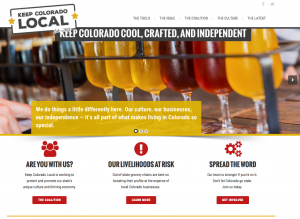
Homepage features quick links and key messaging.
Web Site
The Keep Colorado Local web site features a dynamic homepage with a mobile-friendly layout. The online home of Keep Colorado Local is designed to feature key information and house an expanding archive of stories, voices, testimonials, videos and tools for supporters as the campaign grows. Check it out and sign up for updates at KeepCoLocal.com.
Social Media
The Keep Colorado Local social media hubs work seamlessly with our web site, encouraging readers to move in between our online portals, learn more and share our content with their friends.
Testimonials from business owners, for example, are featured on “The Culture” section of the web site with buttons to make sharing that content on social media as easy as possible. These testimonials are also featured in our social media posts, encouraging readers to visit the website and view more.
You can stay up-to-date with Keep Colorado Local and our coalition partners on Facebook, Twitter and our email updates.
Print Collateral
From stickers to palm cards, table tents to coasters, bottle-hangers to window clings, and much more, OnSight is providing coalition partners with the visibility tools they need to spread the word and grow our Keep Colorado Local team.
-
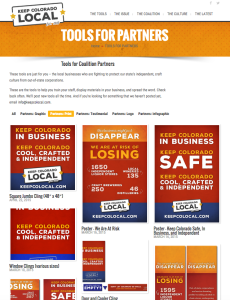 Point of sale and outreach materials available for download and order on the KCL web site.
|
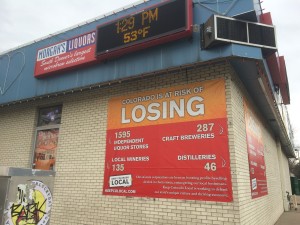 Custom banners and point-of-sale signage |
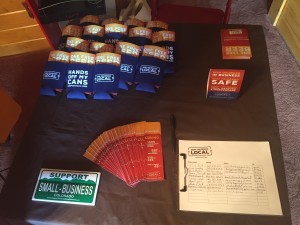 Outreach collateral materials |
-
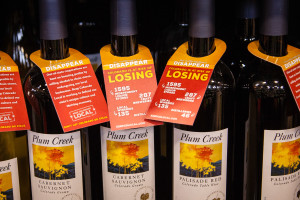 Bottle tags.
|
News
Over 100 people from local businesses gathered at Argonaut Liquors in Denver to launch Keep Colorado Local and deliver a clear, united message: alcohol sales in chain store would harm local businesses, Colorado’s economy, and our craft culture.
Onsight works to facilitate communication with the press and ensure that the Keep Colorado Local coalition’s efforts are in the news:
Fox31: Liquor stores, brewers join forces to keep alcohol sales out of grocery stores (video)
Liquor store owners and breweries are joining forces to fight an expected ballot proposal that would allow supermarkets in the state to sell alcohol. The store owners and breweries are calling their campaign “Keep Colorado Local” as a way to keep alcohol sales out of big-store supermarkets.
Durango Herald: Beer and wine in grocery stores? Brewers, vintners, distillers and liquor store owners oppose effort
Brewers, distillers, liquor store owners and vintners are not toasting a proposed ballot initiative that would allow the sale of beer and wine in grocery stores. They stood together at a news conference Thursday at Argonaut Wine and Liquor in Denver where the Keep Colorado Local coalition expressed concerns about the initiative led by larger retailers.
Denver Business Journal: Opposition launches campaign against full-strength beer sales at grocery stores (video)
Colorado’s first ballot-issue battle of 2016 is underway, and it is about beer.
A coalition led by the Colorado Brewers Guild and the Colorado Licensed Beverage Association kicked off the “Keep Colorado Local” campaign on Thursday, hoping to defeat or avert a potential ballot measure that would allow grocery stores to sell full-strength beer and wine.
Westword: CRAFT BREWERIES, LIQUOR STORES RALLY TO FIGHT GROCERY STORE BEER SALES INITIATIVE
For the last few years, Colorado craft breweries and their allies at local liquor stores have worked on convincing state lawmakers to keep grocery and convenience stores from being allowed to sell full-strength beer, wine and booze. Now these small and medium-sized businesses are cracking open a consumer campaign in advance of a possible effort by the supermarket chains to take their case directly to voters in 2016.
by OnSight | Dec 2014 | Campaign, politics, Press and Media, Print Communications, video, Web Communications
What do farmers markets, pumpkin carving, fog machines and smokestacks have in common? All were utilized by the OnSight team in the name of bringing climate change to the forefront for Colorado voters. This past fall, OnSight teamed up with NextGen Climate Colorado with the goal of making the issue of climate one of the top issues voters consider at the polls. How? By attracting earned media, organizing a stunt or two, and packaging creative content.
Over the course of nearly four months, the communications team was able to introduce and establish NextGen Climate with Colorado’s press corps, create an online presence and produce a steady stream of social media, blog content and videos, and develop and deliver localized messaging in regards to the 2014 senate race. During this time, the NextGen Climate Colorado team was able to establish itself as a serious player in Colorado politics and regularly influenced questions asked of candidates during debates and in coverage altogether. On multiple occasions outlined below, the team rose above the campaign season noise to receive earned-media attention amid stiff competition for coverage — notably during the Denver EPA hearings, the Club 20 Debates, with Cory Gardner’s House of Deception which coincided with Michelle Obama’s visit in Fort Collins, and the placement of the state director’s op-ed in the Denver Post.
Here’s a look at some of our favorite for NextGen Climate Colorado:
Videos:
News Clips:
9News: EPA hearings turn Denver into political stage
Denver Post: Demand candidates take action on climate issues
by OnSight | Sep 2014 | politics, Press and Media, Social Media, Trends
Scads of small type. Truncated graphics. Unusable forms. Browser-crashing incompatibility.

On the right, a site not optimized for mobile — tiny, cut-off text, pics that have to be zoomed-in to see, and tiny, cluttered menu. On the right, clear navigation, mobile-friendly text, and clear calls to action.
There are people looking for you — wanting to learn more, wanting to volunteer or even donate to you campaign or cause. And more and more (maybe even up to 50% of the time) they’re using their mobile phones to do it.
Not sure if your web site is mobile-compatible? Don’t feel too terribly bad — turns out some of the major political campaigns are behind the curve, too.
From Politico:
A POLITICO analysis of mobile sites for about 40 competitive House and Senate races found that a majority were plagued with missed opportunities for campaigns trying to find volunteers, donors and voters. The no-nos range from clunky pages that frequently crashed or weren’t formatted properly to content that was just too tiny to read.
Another big problem often discouraged by some political consultants: multiple pages of navigation before a potential donor can hit the send button with their all-important credit card numbers.
…
Political operatives from both parties say they recognize mobile’s tantalizing possibilities. Still, many campaigns are cutting corners on the mobile front — ignoring pleas for fewer tabs or larger font sizes — even if the potential payoff could mean more votes or thousands of dollars in additional donations. They’re reluctant to shift limited budget dollars away from traditional TV ads, especially for innovations that have a short shelf life limited to this election season.
To digital campaign strategists, seeing the shortcomings on the mobile front makes little sense considering how Americans have come to obsessively use their phones as their primary source not just for daily communication but also for entertainment.
Most users don’t want to read lots of text online at all, and even less so on mobile. And most campaigns can’t spring for the coding and development for a full mobile site, custom forms, and the tools required for credit card processing.
That said, if people are looking for you on their phones — and they are — there’s no excuse for making sure they can find you.
The priorities:
1. Using web analytics, determine what portion of your audience is accessing your site via mobile.
2. Are there particular times of week or year when mobile usage spikes?
3. Is there particular content that mobile users access more than desktop users?
4. Can your donation form be simplified or otherwise optimized for mobile?
5. Homepage should always be legible in mobile!
All this information inform the urgency and priorities for building out mobile compatibility.
After tackling the minimum, you can further refine your mobile site with custom content for mobile pages (shorter, more tightly-drafted content and photos), custom graphics and features to more closely mimic your desktop-viewable web site, other bells and whistles to integrate with social and other mobile-friendly tools.
cover image from Flickr user /marcoarment
by OnSight | May 2014 | Google, Press and Media

Coding for good at the Google GovDev Challenge.
About 120 coders, hackers, and software developers from around the region gathered at Galvanize in Denver on a sunny Saturday morning for the very first Google GovDev Challenge, a two-day live coding competition. The Google GovDev Challenge was created with the intent to improve citizen service, as well as to find creative solutions to challenges faced by state agencies. Winning teams took home up to $5,000 in awards.
On the first day of coding, participating partners, the State of Colorado and the State of Wyoming, presented the following three challenges to coders:
Challenge 1: Disaster Assistance Center Automation
Sponsoring agency: State of Colorado
Challenge 2: Disaster Assistance Center Materials Management
Sponsoring agency: State of Colorado
Challenge 3: Budget Data Transparency
Sponsoring agency: State of Wyoming
Participating coders had 24 hours to create solutions to the three challenges. Each challenge was judged based on the following categories:
- How well it solves the challenge (40%)
- Originality of the idea (20%)
- Technical merit (20%)
- Use of Google tools (20%)
Through the duration of the challenge, OnSight worked with Google and event partners and provided media relations consulting for the event. OnSight helped arrange and foster a partnership with Denver’s 9News that provided media coverage throughout the first-ever Google GovDev Challenge.
Here are a few clips of event coverage:
The Denver Post: Hackathons: Giving back to the community, one line of code at a time
Civic hackathons, popping up more frequently over the past couple of years, are turning into the geek’s way of giving back to the community.
Google partnered with Colorado and Wyoming a week ago to host a hackfest in Denver, where about 150 software developers hunkered down for a marathon, 24-hour coding session.
Participants ranged from hobbyists to partners at tech companies.
Their mission? To create solutions for challenges facing local and state governments.
KUSA-TV (9News): Coders challenged to create disaster app
KUSA – It’s a challenge to computer coders everywhere.
In Denver 150 of the country’s best software programmers are battling it out to create an internet app.
9NEWS reporter Eric Egan takes you into the world of a Google hack-a-thon in the video above.
Fremont County Radio: Wyoming Developers Win 1st, 2nd & 3rd Places at First Ever Google GovDev Competition
Lander, WY, May 21, 2014: Approximately 28 professional development teams from across Wyoming and Colorado gathered to participate in the opportunity to win up to $5000 from Google. Code Rangers, a Wyoming team made up of Wyolution co-owners Jared Kail and Mark Thoney, Sheridan Programmers Guild Owner, Anne Gunn, and Gannett Peak Technical Services Owner, Tighe Fagan won first place, and Gannett Peak Technical Services owner Ryan Fagan’s team, Auditor Search, won third place in the Wyoming Sponsored Category: Budget Data Transparency Challenge. Second place was given to Speed Goats, a Wyoming team made up of Lee Pepper of County 10 and Pitchengine, Jordan Dean, Marshall Moore, Shawn Becker and Jonathan Barella in the Colorado Sponsored Category: Disaster Assistance Center Materials Management.
According to govdevchallenge.com, software developers were given 24-hours to code and find creative solutions to challenges faced by government agencies in Colorado and Wyoming. Participants needed to make use of at least one Google tool in the final project. The competition offered one Wyoming challenge and two Colorado challenges for developers to take-on. Wyoming’s challenge was Budget Data Transparency, and the two Colorado challenges were Disaster Assistance Center Automation, and Disaster Assistance Center Materials Management.
County 10: Two Lander men among top placers in last weekend’s coding challenge in Denver
(Denver, Colo.) – Two Lander men, including one of County10′s own developers, took top spots in last weekend’s Google GovDev Challenge. The event brought computer coders from across Colorado and Wyoming to compete in a 24-hour coding contest, which was sponsored by both states.
County10′s Lee Pepper, as part of the Speed Goats team, took second place in the Disaster Assistance Center Automation challenge sponsored by the State of Colorado. Twelve teams participated in that challenge.
GovTech.com: Google’s GovDev Challenge Provides Real Solutions for Government
On May 18, Google wrapped up its first GovDev challenge, a 24-hour hackathon that challenged local software developers and entrepreneurs to solve problems facing state agencies in Colorado and Wyoming. More than 100 developers joined with government workers, community groups and organizers in Denver for the event, and when the coding was done, nine teams were awarded cash prizes. Officials said the event was a success because it produced software they may ultimately use in their businesses, it sparked new relationships between government and the public, and it gave their agencies new ideas on how to work.
At the start of the event, three challenges were announced, two for Colorado and one for Wyoming, and teams and individuals selected a challenge and began working.





 The Keep Colorado Local coalition represents over 1,000 local businesses. These independent businesses joined the Keep Colorado Local campaign to fight out-of-state corporations and keep them from changing our liquor laws and allowing chain stores to sell alcohol. OnSight is proud to build this effort and grow a coalition to defend local businesses, preserve public safety, and protect Colorado’s craft culture.
The Keep Colorado Local coalition represents over 1,000 local businesses. These independent businesses joined the Keep Colorado Local campaign to fight out-of-state corporations and keep them from changing our liquor laws and allowing chain stores to sell alcohol. OnSight is proud to build this effort and grow a coalition to defend local businesses, preserve public safety, and protect Colorado’s craft culture.





